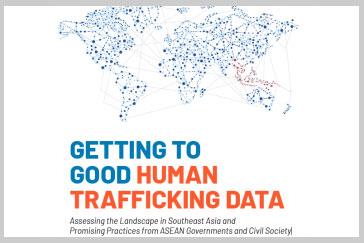Executive Summary:
Over the past two decades, tremendous progress has been made in raising awareness of human trafficking, enhancing relevant legal norms, and ensuring more robust care for survivors. Yet, the anti-trafficking movement continues to struggle to evaluate the quality of approaches, interventions, and policies. It is critical at this juncture to encourage not only more, but better data that can help practitioners to understand the issue more holistically, including its root causes and where limited resources should be directed to have the most impact. Good, responsible data accurately reflect reality with maximum possible completeness and minimal bias and error, while giving proper consideration to privacy and security.
Historically, calls for enhanced data related to human trafficking have focused rather exclusively on prevalence estimates and descriptive statistics related to monitoring and evaluation metrics set by donors. From open source investigation to big data analytics, the widespread digitization of data combined with technological advancements and innovations in analysis have brought new opportunities to begin answering the call for a data-driven understanding of the complex problem of human trafficking — and an evidence-based approach to combatting it. However, this is not the daily work of the great majority of anti-trafficking practitioners. As resources continue to be invested into new technologies and big data, the movement must likewise invest in the fundamental data infrastructure and skills training of civil society organisations and government agencies at the frontlines.
Enhancing and aligning data standards and practices in support of interoperable systems and comparable data will help clarify the problem and make the movement better equipped to combat it. In Southeast Asia specifically, the recently adopted Association of Southeast Asian Nations’ (ASEAN) Convention Against Trafficking in Persons, Especially Women and Children (ACTIP) and associated ASEAN Plan of Action promise to be important tools for the region in realizing the objective of good, responsible data to promote a more effective anti-trafficking effort. Getting there will require tremendous investments on behalf of governments and the donor community into human and technological resources needed to support better data practices, as well as a fervent commitment on behalf of the practitioners in both civil society and government who are doing the day-to-day work of collecting these data. The companion Getting to Good Human Trafficking Data: Everyday Guidelines for Frontline Practitioners in Southeast Asia aims to support this work.


